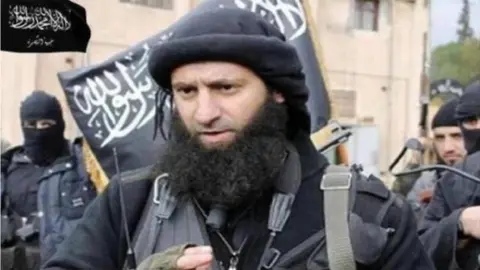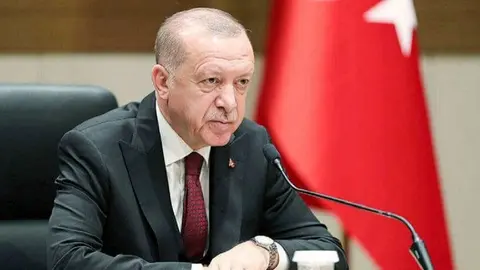Syria's new leader anticipates Trump era with well-orchestrated media appearances

Syria's new leader, Ahmed al-Sharaa (known as Abu Mohamed Al-Jolani), is making major and well-orchestrated media appearances.
This is all part of a strategy in the run-up to Donald Trump's rise to power in the United States.
Sharaa seemed to speak from professionally prepared points of view while calmly answering even difficult questions, trying to reassure his domestic and foreign audience while at the same time not hiding his intention to consolidate his grip on power for the time being.
An interview with Saudi state broadcaster Al-Arabiya on Sunday was no exception.
He told the pan-Arab television channel that holding elections in Syria could take up to four years, the first time he has commented on a possible election timetable since Bashar Al-Assad was ousted this month.
Drafting a new constitution could take up to three years, Sharaa said, adding that it would take about a year for Syrians to see dramatic changes.
The comment by Sharaa, who leads the Hayat Tahrir al-Sham group that toppled Assad on December 8, comes at a time when the new government in Damascus has been trying to reassure its neighbours that it has moved away from its roots in Islamist extremism.
The group's lightning campaign ended a 13-year civil war, but left a number of questions about the future of a multi-ethnic, multi-confessional country where foreign states, including Turkey and Russia, have strong and potentially competing interests.
While Western powers welcomed the end of the Assad family regime in Syria, it is unclear whether HTS will impose strict Islamist rule or show flexibility and move towards democracy.
Sharaa said that HTS, formerly known as the Nusra Front, would dissolve at a national dialogue conference.
Asked about the group's dissolution, Sharaa said: ‘Of course. A country cannot be governed by the mentality of groups and militias’.
The group was once affiliated with extremist groups Islamic State (ISIS) and al-Qaeda, but has since renounced both and sought to reposition itself as a force for moderation.
The country has repeatedly vowed to protect minority groups, which fear that the new rulers may try to impose an Islamist government, and has warned against attempts to incite sectarian conflict.
According to Sharaa, the national dialogue conference would include broad participation of Syrian society with votes on issues such as the dissolution of parliament and the constitution.
‘We have to rewrite the constitution’, which could take “two or three years”, Sharaa added.
UN Security Council Resolution 2254, adopted in 2015, outlined a roadmap for a political transition in Syria that included drafting a new constitution and holding UN-supervised elections.
UN special envoy Geir Pedersen, who visited the country this month, said he hoped Syria would ‘adopt a new constitution ... and that we will have free and fair elections’ after a transitional period.
Diplomats from the US, Turkey, the European Union and Arab countries who met in Jordan this month also called for ‘an inclusive, non-sectarian and representative government formed through a transparent process’.
An interim government has been appointed to run the country until 1 March.
Sharaa also said he hoped US President-elect Donald Trump's administration would lift sanctions on Syria. Senior US diplomats visiting Damascus this month said Sharaa was pragmatic and that Washington decided to remove the 10 million dollar bounty on the HTS leader's head.
‘Sanctions against Syria were issued based on the crimes the regime committed,’ Sharaa said, adding that since Assad left, ’these sanctions should automatically be removed.’
Reassuring neighbours
In response to a question about neighbouring states' concerns about Islamic extremist groups, he said, ’We will not work to export the revolution. We want to manage the phase with the mentality of the state and not the revolution,’ he said, reiterating that they are interested in establishing strategic relations with all regional states.
He seemed eager to meet Turkey's demands that it control Kurdish militants.
On the situation in northeast Syria, Sharaa said there are talks with all sides to resolve remaining disputes, including with the US-allied Kurdish Syrian Democratic Forces (SDF).
‘We reject Syria becoming a platform for the Kurdistan Workers‘ Party (PKK) to launch attacks against Turkey,’ he said.
He said weapons should only be under state control, adding that the defence ministry would welcome those able to join the army.
He tried not to irritate Russia and also to set guidelines for relations with Iran.
In the interview, Sharaa said Syria shares strategic interests with Russia, a close ally of Assad during the long civil war and which has military bases in the country, reiterating conciliatory signals his government has previously made.
Sharaa said this month that Syria's relations with Russia should serve common interests.
Russian Foreign Minister Sergei Lavrov said the status of Russia's military bases would be the subject of negotiations with the new leadership in Damascus.
‘It is not only about the maintenance of our bases or strongholds, but also about the conditions of their operation, maintenance and supply, and interaction with the local side,’ he said in an interview with the Russian news agency RIA published on Sunday.
Commenting on future relations with Tehran, Sharaa said: ‘Syria cannot continue without relations with an important regional country like Iran, but these must be based on respect for the sovereignty of both countries and non-interference in the affairs of both countries.
Iranian-backed groups, including Lebanese Hezbollah militants, had a strong presence in Syria during the Assad government, and Iran has long provided what it described as military advisers to the Syrian armed forces.










